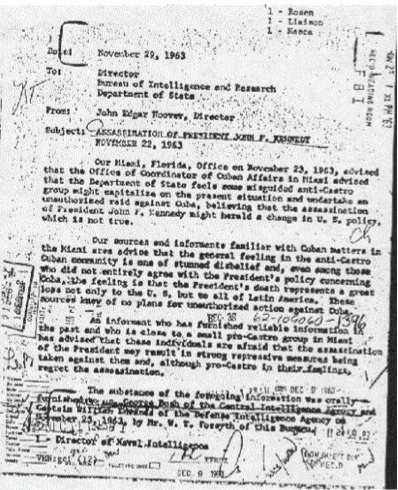(Article changed on July 16, 2013 at 20:09)
It has been nearly fifty years since the assassination of John F. Kennedy became the baptismal event for the sickness that burnt the American dream like a draft card. Vietnam followed, Malcolm fell, then Martin, and Bobby, the left got old and turned right, and somewhere along the line many lost the taste for fighting back. Meanwhile, the media have been stacking skeletons ever since, but that closet grows ever more full, stale, and rotten. Still, the pretense continues: In our age, most mainstream journalism has become a kind of exercise in organized non sequiturs, like artless Beckett, farce without wit.
The premise is objectivity, we are told. Fair and balanced,
we are told. Modern investigative reporting, by the available evidence of
television and print media, often seems to regard objectivity as reporting all
issues as if they have two sides -- no more and no less, and to draw no
conclusions regardless of how inane one side's claims may be. This seems
frequently to be true even in trivial matters, but it gets worse the more
controversial the issue. Network news seems to take its cues from intelligent
design activists who just want schools to Teach the Controversy.
This context makes Joseph McBride's new book Into The Nightmare a jagged reminder of old-school reportage. Going against the grain, he asks difficult questions and tries hard to answer them. And even if every question cannot be answered satisfactorily, much compelling information surfaces throughout.
One of the many unusual things about this book is that McBride is, on the surface, a resolutely mainstream figure. A longtime journalist with numerous publications to his credit, including The New York Review of Books, Cineaste, The Los Angeles Times, Sight & Sound, and The Nation magazine, Into My Nightmare is his 17th book. Included in his previous works are biographies of Steven Spielberg and Frank Capra, as well as a soon-to-be-reissued long-form interview with Howard Hawks, Hawks on Hawks. However, he been leading a double life. In the background to his work in film and as a college professor, he has literally spent a lifetime researching this case, having worked for the Kennedy campaign in 1960 at the age of 12. The shock of the president's murder three years later drove him to question the initial reported facts of the case and grow to understand the terrible reality of our times. Hence the nightmare -- deeply personal for the author, but deeply relatable for anyone interested in truth.
McBride is already known to the JFK research community as, among other things, the man who discovered the Hoover memo, which has been written about and referenced many times over the years, particularly in Gaeton Fonzi's superb The Last Investigation. Russ Baker also made the Hoover memo a central part of his investigation into the Bush family, Family of Secrets. The Hoover memo is, of course, the peculiar document dated November 22, 1963, sent by the FBI leader in which a "Mr. George Bush of the Central Intelligence Agency" is noted to have been debriefed on the matter of the assassination.
The Hoover Bush memo by Public Domain - government document
THREE ACTS
The book, like a well-crafted screenplay, is broken up into three acts. The first section covers McBride's personal history as a young man and his involvement as a Kennedy supporter. Included is a photo of the president taken by the author himself during a campaign visit to Wisconsin, as well as a thank-you letter from Kennedy after achieving the presidency. It goes into his early interest in journalism, his initial shock at the murder, and finally his disbelief in the story and pursuit of the trail leading to this book fifty years later.
The second section of the book is a kind of survey of the evidence. McBride has done his homework, both in terms of familiarity with the published work on the case, the internal documents themselves, and direct interviews with many of the involved parties. He cites many of the best works in the genre -- Fonzi, Peter Dale Scott, James Douglass, John Armstrong, and others, but also makes it clear he follows the John Simkins forum and Bill Kelly's website, among others. In short, he has seemingly been following every available lead in his off hours.
The third and longest section of the book largely concerns his deep investigation into the murder of J. D. Tippit. The general public is typically not aware that Lee Harvey Oswald was never arraigned for the murder of the president, but rather for allegedly killing a police officer called Tippit. McBride has done excellent work in this area, and included in this book are excerpts from interviews done with Tippit's father, as well as his wife Marie and his mistress Johnnie.
Part memoir, part investigative journalism, part cultural analysis, McBride uses well lessons learned in his long and successful career in media. One of the real strengths of the book is how smoothly written it is, a difficult task when writing about the complexities of the Kennedy assassination. Like Jim Douglass's JFK and the Unspeakable, the book will have appeal to general readers as well as research specialists, and the style has a great deal to do with it. Armed with a cultural knowledge not generally employed in JFK books, McBride sprinkles in allusions and connections that aid understanding and even occasionally startle. In addition, it is the work of someone who has seen the assassination not as a singular incident in our nation's history, but as part of a context and continuum of understanding. McBride employs a wide scope to bear in his analysis, bringing in literature, cinema, as well as a journalist's understanding of how history as it is recorded can differ from history in fact -- indeed, how it must be so. This gives his work a breadth that is sometimes missing in the dry, even when notably incisive, work of researchers whose focus is narrower. For example, he writes about the strange and peculiarly American refusal to look at the past as it was:
The effect is a pervasive atmosphere of unreality surrounding postwar American history, a willed decision by most citizens (even some who know better) to live in a fantasy America rather than the far messier place we actually inhabit. The fact that none of the official explanations for all the major events in modern American history -- the assassinations of John F. Kennedy, Robert Kennedy, Malcolm X, and Martin Luther King, Jr.; the Vietnam War; Watergate; Iran/contra; the Gulf War; 9/11; and the Iraq War -- makes sense when the evidence is examined with care should be enough to make even the most trusting American citizen realize he or she is being duped by our own government. (136)
He does not back away from making specific criticisms within the community as well. For example, his assessment of Mary Ferrell is that she was a disinformation agent, based on his personal dealings with her. Ferrell, of course, personally disliked Kennedy despite colleting an enormous quantity of information about the assassination, which survives as The Mary Ferrell Foundation. McBride also believes that Ferrell's release of the audio tape to the House Select Committee on Assassinations (HSCA) near the end of their run was done so only to provide a kind of escape hatch for Robert Blakely to suggest a conspiracy without being forced to investigate its origins. He relates that the first-generation researcher Penn Jones told him to "stay away from her." (218-221)
In general, McBride does an excellent and thorough job of giving the reader a sense of the complications in the case without getting bogged down in relentless detail. As far as where he stands on some of the more controversial issues in the case, he is with David Lifton and Doug Horne on body alteration and believes that John Armstrong has effectively proved his two-Oswald thesis in Harvey & Lee. (100) One of the strengths of the book, however, is that McBride reports, rather than polemicizes; even if one disagrees with aspects of his view on the case, one can hardly fault the approach.
He also calls attention to what is still one of the greatest pieces of investigative journalism ever in the Kennedy case, Edwin Black's article on the Chicago plot. As McBride points out, the parallels are incredible. In this case, a designated patsy named Thomas Arthur Vallee filled the bill as Oswald-style patsy to an amazing degree. Vallee "was a thirty-year-old-ex-Marine who had been assigned to a U-2 base in Japan, had been diagnosed as a paranoid schizophrenic by military doctors, and later had trained anti-Castro Cubans to assassinate Castro. Vallee had a job in a warehouse overlooking Kennedy's planned motorcade route." (307) He also points out a remarkable "coincidence' -- had Kennedy not cancelled the November 2, 1963 Chicago visit, in part because of an anonymous tip called in by someone identifying himself only as "Lee' -- he would have possibly been murdered in Chicago on the same day that the Diem brothers were being murdered in Vietnam.
(Note: You can view every article as one long page if you sign up as an Advocate Member, or higher).






